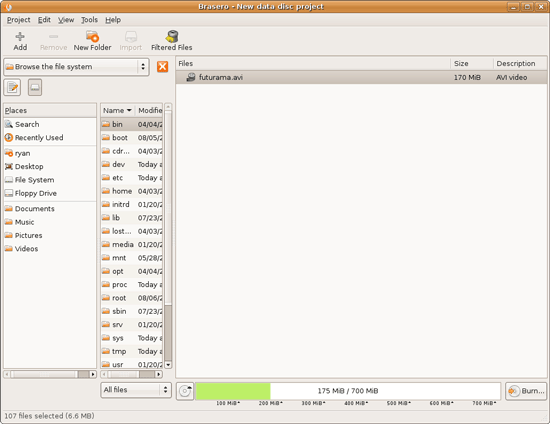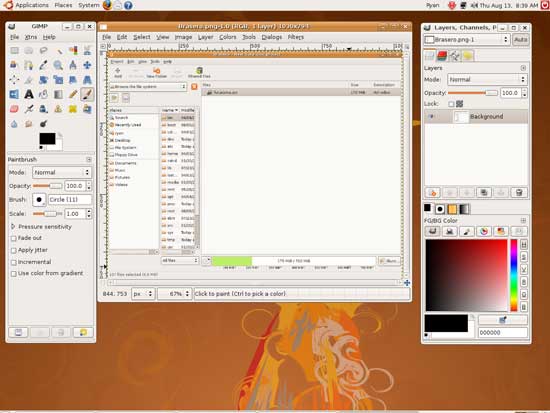Revisiting Linux Part 1: A Look at Ubuntu 8.04
by Ryan Smith on August 26, 2009 12:00 AM EST- Posted in
- Linux
Applications: CD Burning/Image Editing
Windows Default: Drag & Drop
What I use: Nero
Ubuntu Default: Drag & Drop / Brasero
One of my minor annoyances with Mac OS X and Windows is that their default disc burning abilities are insubstantial. Both offer drag-and-drop file burning, audio CD burning through their respective audio suites, and in Mac OS X’s case it offers ISO burning too, but that’s it. As a long-time Nero user, I would rather have the finer level of control a disc authoring suit such as Nero or Toast offer when it comes to building and burning discs.
As it turns out, this is something that Ubuntu gets right. Not only does it include drag-and-drop burning abilities like the other OSes, but it includes a disc authoring suit: Brasero. In a nutshell, Brasero is a clone of Nero Burning ROM, much like Rhythmbox is a clone of iTunes. It sports similar UI elements as Nero, including the handy disc capacity meter towards the bottom of the window. As such, for anyone used to Nero it’s an easy transition to make.
Where Nero users will feel left out is that it’s only a clone of Nero Burning ROM, and little else. It can burn audio CDs, data discs, ISOs, and copy whole discs, but that’s it. It doesn’t have any audio/video mastering abilities like Nero does. In fact there’s nothing on the default Ubuntu install like this – Windows Movie Maker and iMovie have no direct counterpart on Ubuntu. This makes Ubuntu more capable than Windows or Mac OS X for data CDs, but underpowered for most kinds of media disc creation. Depending on how you use Ubuntu, this may or may not be an issue.
Meanwhile for users accustomed to drag-and-drop burning, you’ll find the drag-and-drop CD/DVD Creator satisfactory. As CD/DVD Creator doesn’t support packet writing, you’re limited to traditional building & burning via the GUI. CD/DVD Creator doesn’t support writing multisession discs either, so it’s entirely a write-once operation. Whether this is a problem or not depends on if you use packet writing – a quick check around here didn’t turn up anyone that uses it, so I’m not sure there are all that many people that are going to miss it.
For power users there are other options. The Ubuntu repositories contain other disc authoring suites, and a cut-down version of Nero is available too. We haven’t had a chance to check out either of these, but it looks like neither option provides a solid audio/video authoring package. Anyone needing such abilities may need to look elsewhere. For daily use however, it has everything I need.
Final Verdict: Meets My Needs
Windows Default: Paint
What I use: Adobe Photoshop CS3
Ubuntu Default: GIMP
In doing research for this section of our look at Linux, one thing became abundantly clear: Image editors on Linux have the potential to be a holy war. For Windows and Mac OS X the gold standard for image editing programs is Adobe Photoshop, but as Adobe does not offer it for Linux it’s up to the Linux community to fend for itself. In doing so they came up with the GNU Image Manipulation Program (GIMP) which strives to match Photoshop’s abilities on *nix for free. What results is an interesting situation.
In spite of the fact that I can barely make sense of Photoshop, it’s clear that GIMP is not just a Photoshop clone, for better or for worse. For someone looking for what would amount to a Linux version of Photoshop, they’re clearly going to be disappointed, as GIMP is not Photoshop or even Photoshop-lite. It’s an advanced image editor that is in a class of its own.
As far as default programs are concerned, GIMP is clearly miles and miles ahead of Windows’ Paint, and Mac OS X’s complete lack of a freestyle image editor (iPhoto being the next-closest thing). Even if it’s not up to Photoshop’s level of abilities, it’s a very capable image editor that comes with Ubuntu, rather than needing to be a separate program download on Windows or Mac OS X. This leaves me in a somewhat odd position.
Paint is anything but powerful, but it’s also simple. GIMP and Photoshop have at least one thing in common: they’re both capable of being complex beasts. As such I’m not convinced that it’s a good thing that GIMP is the default image editor on Ubuntu. For a beginner, it may be too powerful for its own good. For those reasons while it’s the most powerful default image editor when compared to Windows or Mac OS X, I’m not sure it’s the “best” if we’re to consider what fits user needs.
At any rate, when it comes to my own uses, I’ve previously mentioned that I’m not particularly competent than Photoshop. For image preparation for our articles it does the job nicely, while it’s clearly overkill for the task. For what little I do with Photoshop, GIMP works quite well, giving it the distinction of being the only default image editor that does what I need. For these reasons while it’s not a perfect replacement for Photoshop overall, it more than meets my needs for day-to-day use.
Final Verdict: Meets My Needs












195 Comments
View All Comments
Telkwa - Wednesday, August 26, 2009 - link
Nobody's going to agree with the entire article. I'm just glad to see Anandtech paying some attention, and would welcome any articles, tests, reviews, etc.It's embarrassing to visit the "Linux" tab and see the latest article was posted in July of 2005...
Geraldo8022 - Wednesday, August 26, 2009 - link
This is based on Ubuntu and I installed it this past weekend. I am having certain issues with it. Yes, it is free. Overall I like it very much and am pleasantly surprised. But, this has shown that Windows 7 will be a comparative bargain to me. I do not have the time to sit in front of the computer and play with Linux; trying to find out why certain videos don't play and why I am having eye strain and clicking on an audio link that doesn't play and a few more. When I go to the Mint forums I am confronted with a Tower of Babel what with all of the acronyms, and told to go to the terminal and type $surun%(8#**#. Ok, now turn your head and cough.I'll keep Linux on this machine to boot up and play with now and then. It beats solitaire for the time being.
VooDooAddict - Friday, August 28, 2009 - link
You hit on a good point. People I've setup with dual booting linux distros and windows begin to appreciate what they are paying for with windows. Typical response is "This is cool (Ubuntu) and I can see why some people like it. But I'm going to stick with windows, it's worth the money to me."They appreciate that Linux could work, but see the "value" in paying form something familiar.
VooDooAddict - Friday, August 28, 2009 - link
I run Vista on my main PC. Vista on all the spare LAN gaming PCs. I have an Ubuntu 9.04 VM and Ubuntu Netbook Edition on my old tablet PC (small and netbook like).Locutus465 - Wednesday, August 26, 2009 - link
Just out of curiosity what user mode were you having guests run in? Even in vista I don't provide anything greater than standard user. With that guests need my password (which they don't have) to mess my machine up. Going back as far as Windows 2000, as long as you pair Windows with good spyware (spybot, or for XP defender if you choose) and antivirus (I like Avast and AVG both free and have nil footprints) you basically don't have to worry about system security as long as the person is running a standard user account.My my parents system, we went from having to wipe and reinstall windows every time I came home from college, to a rock solid system that absoultly never failed when I performed these steps. I still like the XP/2000 behaviour of simply denying access better than the current UAC implementation. But Vista 64 + UAC (active) seems to be secure enough, particularly when paired with the aformentioned anti-virus software.
Ryan Smith - Wednesday, August 26, 2009 - link
For what it's worth, it's an admin account. I know, I know, I could do Limited User. But that tends to just elicit complaints. XP's Limited User mode is embarrassing compared to how well Vista/Win7 does it.Since it's basically just a web browsing laptop anyhow, it's basically a perfect fit for Ubuntu since I wouldn't need to be concerned with Windows malware period.
leexgx - Wednesday, August 26, 2009 - link
i have to agree even XP in its standered/limited user account mode quite hard for stuff to install but not imposable (Vista and win7 with UAC on and an standered account with the admin account passworded should prevent the system from been messed up)aguilpa1 - Wednesday, August 26, 2009 - link
It seems the OS does not like core 2 duos and nvidia 9800GTX graphics, something even OSX was able to handle.samspqr - Wednesday, August 26, 2009 - link
* for me, the best possible way to install applications on any OS, but specially in one that is free (libre) is as follows: you search on the internet for the best program to meet your needs, you find it, you copy some code that identifies it, and paste that in your package manager, which then connects to some database, checks that the program is not malware, looks for the latest version, and proceeds to download and install it, not caring whether it's open source or not; this would beat windows/OSX by a wide margin, and also the current ubuntu system, whose "we don't like this software, on philosophical grounds, so it's going to be a pain in the ass for you to install it" attitude is a bit too problematic* it would be nice if the "auto" option in the installer told you what it's going to do with your hard disk before going on to do it; I never use it, out of fear it might try to do something I don't like
* I missed some comment on that section on how Photoshop CS3 costs a lot of $$$, while GIMP is free
* along these lines, the comparison of total costs in time and money of installing windows/OSX/ubuntu, with all their companion programs, is striking
samspqr - Wednesday, August 26, 2009 - link
and about openoffice:* I didn't check this ltely, but aren't there still problems with VBA compatibility? if I can open my xls/xlsm files but I can't run my macros, it's no good; I have a ton of stuff written in VBA, and I'm definitely not doing all that work again
* the ribbon UI in office 2007 is a royal pain: it's only good for the "It looks like you're writing a letter" users, and you can't get rid of it; there's a lot of people doing real work on excel, and none I talked to likes that ribbon thing, they'd all rather stay with excel 2003